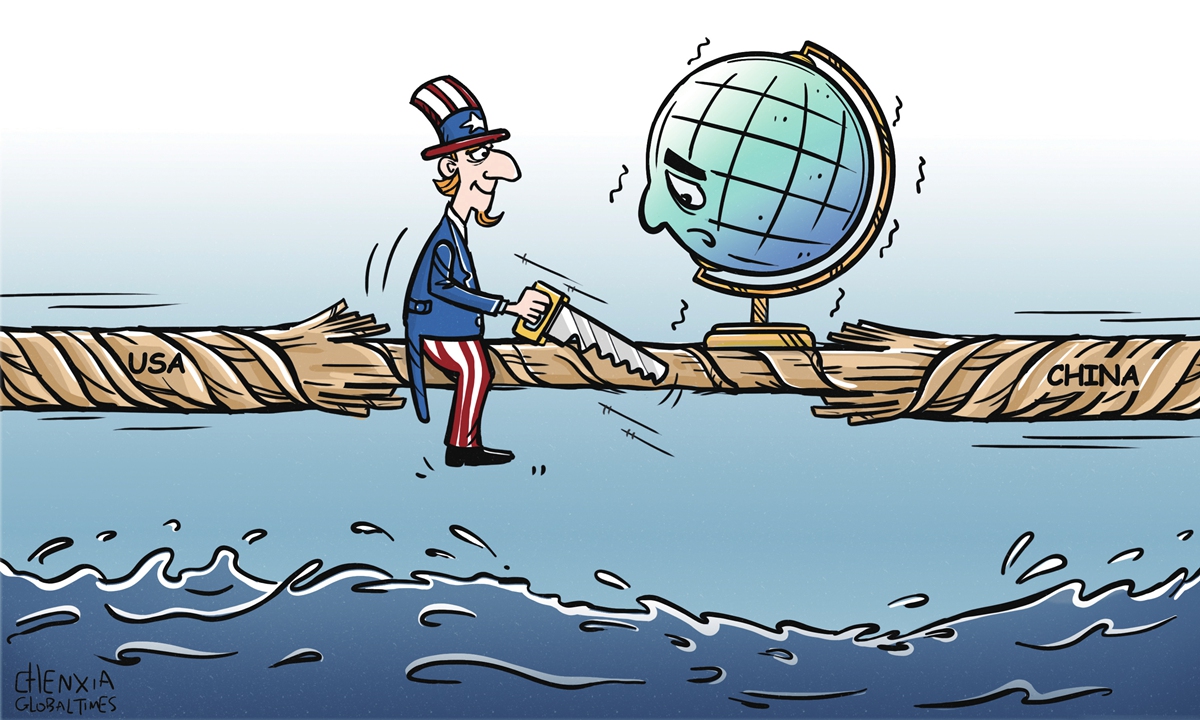Amid busy diplomacy in Beijing, hysteria toward China leaves US in isolated position

Illustration: Chen Xia/GT
Beijing's diplomacy is busy. French President Emmanuel Macron and European Commission President Ursula von der Leyen arrived in China on Wednesday, and the Saudi foreign minister and his Iranian counterpart met in Beijing on Thursday to discuss issues such as steps toward reopening the embassies. The US can only watch and worry: Why China's diplomacy is getting more and more prosperous.
Since the end of last year, important European leaders including German chancellor and Spanish prime minister have visited China one after another. The foreign ministers of Japan and Australia have also visited China, as well as the leaders of ASEAN member states such as Vietnam, Malaysia and Singapore. The US has been left alone in a stalemate with China. Secretary of State Antony Blinken was scheduled to come, but canceled his trip due to the balloon incident. The US obviously is so hysterical on the issue of China that it has been in a practically isolated position.
On the issue of China, Macron is relatively moderate while von der Leyen more aggressive, but they both oppose decoupling from China. Von der Leyen and others who advocate reducing "dependence on China" also know that decoupling from China is not in the interests of Europe at all. It is a reckless approach by the US to suppress China's development and maintain global hegemony. Although Europe hopes for the overall prosperity of the West, the US is now increasingly harming Europe to benefit itself. Advantages brought about by strengthening cooperation with China will far outweigh disadvantages for Europe. They hope to achieve a complex balance in their relations with China.
The Ukraine conflict has weakened Europe, increased its reliance on the US for security, and made Western sources more concentrated toward the US. In regard to matters on China, the US is begging Europe, notably major powers such as Germany and France, to make small compromise, but they will not completely follow US' suit, becoming US servants on China policy and cutting off a strategic source of their current and future development. While more hard-line rhetoric toward China can be heard in Europe, when it comes to actual relations with China, such touch lines cannot be fully put into practice.
China's neutral stance on the Russia-Ukraine conflict has withstood the test and has been generally accepted by all parties. Macron and von der Leyen both hope for China to be more aligned with the West. Despite talking tough sometimes, they are not really expecting a major turnaround from China. In addition, as an increasing number of Europeans become weary of the Ukraine war, although China's peace proposal was rejected by the US and NATO, European leaders such as Macron are not opposed to China's potential role in mediating the Ukraine crisis, Macron has publicly stated that China has a "major role" to play in finding a path to peace in Ukraine.
Given that China has largely stabilized Europe's attitude toward China, the US' attempt to mobilize the West to form a united front against China by taking advantage of ideological differences, Ukraine crisis and tensions in the Taiwan Straits has basically fallen flat. The meeting between US House Speaker McCarthy and Taiwan regional leader Tsai Ing-wen in California on Wednesday local time indicates that the US elites of polarized politics are running out of cards on the China issue and can only step forward in person. If the US is powerful enough, it could have incited its allies to cause troubles for China over the Taiwan question. However, only Lithuania came up as a pawn in the end, none of its Western "chess pieces" gave response. On the contrary, days before Tsai's visit to Central America, Honduras announced to "sever diplomatic ties" with the Taiwan island and establish diplomatic relations with Beijing, further highlighting the weakness of the US' power to control China-related situation.
The recent dazzling diplomatic games are the proof of China's strong capability to defend its vital interests and maintain usual relations with other major powers. Although the US is stronger than China on the whole, it is simply out of its ability in trying to encircle the world's second largest economy and No.1 trading power.
The US has made progress in pushing for a chip alliance going, with Japan and the Netherlands agreeing to join export controls on advanced chip-manufacturing equipment to China. But it is afraid that this will become the last wall the US can build using its fundamental advantage of semiconductors. At the same time, we are witnessing that an increasing number of countries have strengthened their use of currencies other than the dollar. The renminbi has become the most traded currency in Russia. Other major trading nations, such as Saudi Arabia and Brazil, have also begun to use the local currency and renminbi in their transactions with China. The biggest pillar of US hegemony other than the military is starting to shake, and the foundations of US power are loosening. It will be increasingly difficult for the US to maintain its accumulated advantage without developing itself to the fullest extent and by putting a lot of force into undermining China.
It would be good for China to keep calm, make more friends, manage differences more, and put more energy into further self-development. It is very certain that the US' approach is doomed to fail.
The author is a commentator with the Global Times. opinion@globaltimes.com.cn

